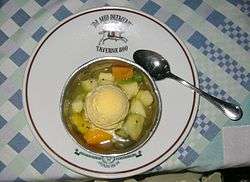Macedonia (food)
Macedonia or macédoine is a salad composed of small pieces of fruit or vegetables. Fruit Macedonia is a fresh fruit salad and is a common dessert in Greece, Romania, Spain,[1] France, Italy and Argentina. Vegetable Macedonia or Macédoine de légumes nowadays is usually a cold salad or hors d'oeuvre of diced vegetables, in France often including red beans. Macédoine de légumes is also a hot vegetable dish consisting of the same vegetables served with butter.[2] Prepared macédoine, a mixture of diced vegetables and often peas, is often sold canned or frozen.[3] It is sometimes mixed with mayonnaise combined with aspic stock, making it similar to Russian salad.
 Macedonia with ice cream | |
| Type | Salad |
|---|---|
| Main ingredients | Fruits or vegetables |

Etymology
The word macedonia was popularised in the middle of the 18th century to refer to mixed fruit salad. This probably alludes to the diverse origin of the people of Alexander's Macedonian Empire,[4][5] but that is "not fully established".[6] It is sometimes said that it refers to the ethnic mixture in 19th century Ottoman Macedonia,[7] but this is not possible, since it is first attested in 1740.[6] Starting later in the 18th century, macedoine could mean any medley of unrelated things, not necessarily edible.[6][8]
References
- "Make time for Macedonia" (January 28, 2006) The Times Archived March 17, 2007, at the Wayback Machine
- Larousse Gastronomique
- "Macédoine". Iga.net. Retrieved 2017-12-22.
- Juan Antonio Cincunegui (24 November 2002) "La palabra en el tiempo", Nuevo Siglo, Buenos Aires, Argentina
- Auguste Scheler (1888) Dictionnaire d'étymologie française d'après les résultats de la science moderne p. 313
- Oxford English Dictionary, 3rd edition, 2000, s.v.
- Dimitar Bechev, Historical Dictionary of North Macedonia, Historical Dictionaries of Europe, Edition 2, Rowman & Littlefield, 2019, ISBN 1538119625, Introduction, p. 1.
- Alan Davidson, (1999) The Oxford Companion to Food, Oxford ISBN 0-19-211579-0. Littré. Larousse du XIXe.